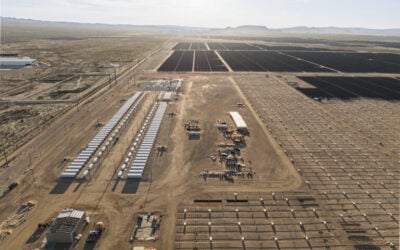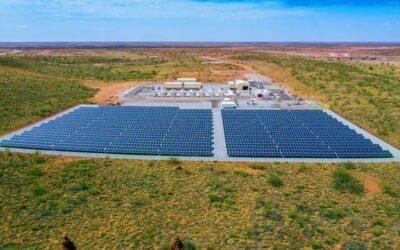Viking Cold's second generation thermal modules, installed at a customer facility. Image: Viking Cold.
A utility in California is investigating how energy storage technology for keeping food and other goods refrigerated could help counter the challenge posed by the famous “duck curve” of PV energy supply and demand.
James Bell of Viking Cold told Energy-Storage.News that his company’s thermal absorption systems, which is being sold to grocery stores, restaurants and other businesses, could be so effective at retaining energy that it can allow fridges and cold storage units to operate without grid power for as much as 12 hours.
Enjoy 12 months of exclusive analysis
- Regular insight and analysis of the industry’s biggest developments
- In-depth interviews with the industry’s leading figures
- Annual digital subscription to the PV Tech Power journal
- Discounts on Solar Media’s portfolio of events, in-person and virtual
The products use phase change materials that react when reaching a certain temperature to retain, emit or absorb heat.
“If they have a mechanical failure or power failure our thermal cells provide backup to them,” Bell said.
“Our thermal storage can keep the freezer cold for up to 12 hours in some situations – it depends on factors like how full the room is, whether it has open doors and so on so it varies but that’s why there’s this ability to store energy in there in the form of photovoltaic.”
The systems his company has developed emerged, much like the technology behind the original flow batteries and indeed some PV cells, from the bones of a historical NASA space programme. Using water with some proprietary additives, the PCMs are put into modules that sit at the top of a refrigeration unit absorbing heat and therefore keeping the produce at the correct temperature. The storage systems include control software enabled with algorithms that help commercial and industrial (C&I) customers reduce kilowatt-hour consumption by up to 30%, shift load to offpeak hours, or combine with PV systems, Viking claims.
Value proposition and California utility interest
This has a number of available advantages to the customer, Bell said. It allows them to increase energy efficiency of their operations and save money on energy demand and their bills, to manage power in such a way that they could “pick and choose when where and how they access their energy”, even participating in demand response programmes if applicable and get better visibility on the condition of their produce, which is obviously important in managing the economics of delivering their goods to market.
As an additional benefit, the thermal cells can continue keeping a room or storage unit cold for several hours without external power, making them perfect for daytime charging from PV, Bell claimed.
Bell said a utility in Southern California, which he declined to name at this stage, is also looking to explore the use of the systems to smooth out peaks in demand. It is understood that the procurement of such a technology would also count towards investor-owned utilities' AB2514 mandated investment in energy storage.
“That point in the day when the PV and people come home and get a peak demand in the evening now, we for the big industrial users are a perfect antidote for the duck curve. When the PV goes off and residential users are coming on, our guys are ramping down their operations can turn off their mechanical equipment and not have to access the grid.
“We’re working with a SoCal utility right now on installing our systems so they can manage the grid at a micro level and allow big industrial customers with freezers and cold storage to come off the grid at the time to keep off the evening spike that they get with renewables.”
On a related note, in a 2014 blog for Energy-Storage.News, Dr Tim Fox, then head of environment and energy at Britain's Institute of Mechanical Engineers, wrote about the need for developing 'cold chains' - better means of transporting food from field to market, particularly in developing nations. This in itself was an important potential application for forms of energy storage, Fox argued.
Viking Cold was among the exhibitors at Hannover Messe trade fair in Germany last week hoping for a personal visit from US president Barack Obama and German chancellor Angela Merkel, pictured at the event on its first day. Image: Hannover Messe.






